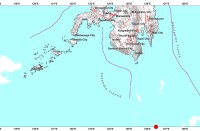(Eagle News) — The Supreme Court has ruled Palawan was not entitled to a share in the proceeds derived from the Camago-Malampaya project.
In granting the national government’s petition for a reversal of the December 16,2005 decision of the Palawan regional trial court, and in denying the petition for review filed by Catholic bishop Arigo Pedro Dulay the SC argued the reservoir, in the first place, was not within the territorial jurisdiction of the province.
The Palawan RTC declared that Palawan was entitled to a 40 percent share of the government’s earnings since Oct. 16, 2001, while Dulay’s petition questioned the constitutionality of Executive order No. 683 issued under then-President Gloria Macapagal Arroyo that authorized the release of funds for development projects in Palawan,
“As defined in its organic law, the province of Palawan comprises merely of islands. The continental shelf where the Camago-Malampaya reservoir is located was clearly not included in its territory,” the SC said.
According to the SC, Presidential Decree No. 1596, which made Kalayaan a separate municipality from Palawan,can neither be the basis for holding that the reservoir forms part of the province’s territory.
The SC said the delineation of territory in the decree, after all, refers to Kalayaan alone and that the inclusion of the seabed, subsoil and continental margin in Kalayaan’s territory cannot be applied by simple analogy.
The High Court also ruled the definition of “Palawan” under Republic Act No. 7611 should not be taken as a statement of territorial limits, and rejected the argument the policy that the state is required to share with LGUs the national wealth applies wherever the local government exercises any degree of jurisdiction.
“An LGU’s territorial jurisdiction is not necessarily co-extensive with its exercise or assertion of powers. To hold otherwise may result in condoning acts that are clearly ultra vires,” the SC said.
If something is ultra vires, it means it was issued beyond the scope of legal authority.
“It may lead to, in the words of the republic, LGUs ‘rush(ing) to exercise its powers and functions in areas rich in natural resources even if outside its boundaries with the intention of seeking a share in the proceeds of its exploration,’ a situation that ;would sow conflict not only among the local government units and the national government, but worse, between and among local government units,'” the SC added.






